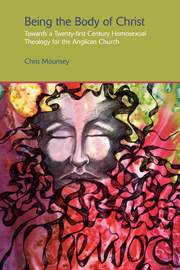Book contents
- Frontmatter
- Contents
- Introduction: Homosexuality and Anglicanism
- PART I
- 1 Oscar Wilde: ‘The Fisherman and His Soul’ – The Failure of Organized Religion
- 2 E.F. Benson: The David Blaize trilogy, A Sexuality Fit for My Lord – E.F.B., God and the Archbishop
- 3 E.F. Benson: The David Blaize trilogy, A Sexuality Fit for My Lord – The Closet of Nightmares
- 4 E.F. Benson: The David Blaize trilogy, A Sexuality Fit for My Lord – The Release of Masturbation
- 5 E.F. Benson: The David Blaize trilogy, A Sexuality Fit for My Lord – From Boy Love to Manly Love: Marriage, Ministry and Maintaining the Gift of Continency
- PART II
- Conclusion: Blindness and Insight – Some Reflections
- Select Bibliography
- Subject Index
- Author Index
2 - E.F. Benson: The David Blaize trilogy, A Sexuality Fit for My Lord – E.F.B., God and the Archbishop
from PART I
- Frontmatter
- Contents
- Introduction: Homosexuality and Anglicanism
- PART I
- 1 Oscar Wilde: ‘The Fisherman and His Soul’ – The Failure of Organized Religion
- 2 E.F. Benson: The David Blaize trilogy, A Sexuality Fit for My Lord – E.F.B., God and the Archbishop
- 3 E.F. Benson: The David Blaize trilogy, A Sexuality Fit for My Lord – The Closet of Nightmares
- 4 E.F. Benson: The David Blaize trilogy, A Sexuality Fit for My Lord – The Release of Masturbation
- 5 E.F. Benson: The David Blaize trilogy, A Sexuality Fit for My Lord – From Boy Love to Manly Love: Marriage, Ministry and Maintaining the Gift of Continency
- PART II
- Conclusion: Blindness and Insight – Some Reflections
- Select Bibliography
- Subject Index
- Author Index
Summary
Introduction
What little critical heritage Edward Frederick Benson enjoys, seems either to read the author of some 70 novels as the creator of the camp characters in the Mapp and Lucia cycle, to make speculations in brief and unfootnoted introductions to reprint editions about which character is the closest self-portrait, or to try to explain the author through the gossip of others who knew him. And if there is one biographical fact that is reported again and again, it is that E.F.B. was one of the six brilliant children of Edward White Benson, Founding Headmaster of Wellington School, Founding Master of the Lincoln Seminary, and Archbishop of Canterbury.
His more thorough biographers, Brian Masters, and Geoffrey Palmer and Noel Lloyd, note that E.F.B. wrote homoerotic novels, but each claim that it is not possible to be certain about the question of his sexuality, concluding that he was very private about it and that we shall never know for certain whether or not he was a homosexual. Speculation about his same-sex desire has been constant. After the success of his first novel Dodo (1893) E.F.B. moved in a fast literary set which included Oscar Wilde and Lord Alfred Douglas. But to base any conclusions about homosexuality on information of that sort is an attempt to prove guilt by association.
- Type
- Chapter
- Information
- Being the Body of ChristTowards a Twentieth-Century Homosexual Theology for the Anglican Church, pp. 35 - 48Publisher: Acumen PublishingPrint publication year: 2012



